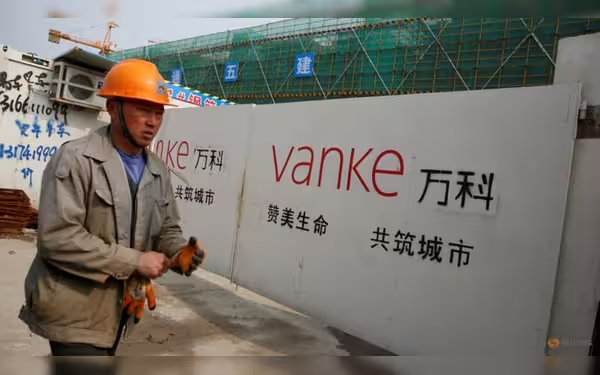Saturday, November 16, 2024 03:19 PM
Vanke Reports US$1.4 Billion Loss Amid Chinese Real Estate Crisis
- Vanke suffers net loss of 9.9 billion yuan.
- Moody's downgrades Vanke's credit rating to B1.
- Chinese real estate market faces unprecedented challenges.
 Image Credits: channelnewsasia
Image Credits: channelnewsasiaVanke reports a staggering US$1.4 billion loss as the Chinese real estate market faces unprecedented challenges and declining home sales.
In recent times, the Chinese real estate market has been facing significant challenges, and one of the major players, Vanke, has just reported staggering losses. Vanke, which was the second-largest property developer in China last year, announced on August 30 that it suffered a net loss of 9.9 billion yuan, equivalent to approximately US$1.4 billion, during the first half of the year ending June 30. This news comes as local real estate firms grapple with an industry-wide crisis, worsened by a decline in home sales amid a sluggish economy.
According to a filing made to the Hong Kong stock exchange, Vanke's losses exceeded the company's earlier estimates, which had predicted a net loss between 7 and 9 billion yuan. The company acknowledged the ongoing difficulties, stating, "It will take time for the recovery of residents' confidence in purchasing houses." This statement reflects the broader sentiment in the market, where many potential buyers are hesitant to invest in property.
Interestingly, Vanke had reported a net profit of 9.9 billion yuan during the same period in 2023, showcasing how dramatically the situation has changed. The company is partially owned by the city government of Shenzhen, which was once viewed as a stabilizing factor for its operations. However, the current state of China's real estate market is alarming, with many developers teetering on the brink of bankruptcy and falling property prices discouraging consumer investments.
In light of these developments, the rating agency Moody's has downgraded Vanke's credit rating to B1, indicating that it is now considered "highly speculative." This downgrade is a clear signal of the mounting pressures facing the company and the industry as a whole. Vanke is not alone in this struggle; it joins the ranks of other troubled developers like Evergrande and Country Garden, both of which have also faced severe financial difficulties.
The real estate sector in China has historically been a significant contributor to the country's economy, accounting for more than a quarter of its GDP. However, after two decades of rapid growth, the industry is now experiencing unprecedented challenges. In an attempt to revive the market, authorities have introduced various incentive measures and announced state support. Unfortunately, these efforts have yet to yield substantial results, as major cities in China reported another drop in real estate prices in July, indicating that demand remains weak.
As the situation unfolds, it is crucial for stakeholders, including potential homebuyers and investors, to stay informed about the developments in the real estate market. Understanding the dynamics at play can help individuals make better decisions regarding property investments. The current crisis serves as a reminder of the volatility inherent in the real estate sector and the importance of exercising caution in financial commitments. The road to recovery may be long, but with the right strategies and support, there is hope for a turnaround in the future.













